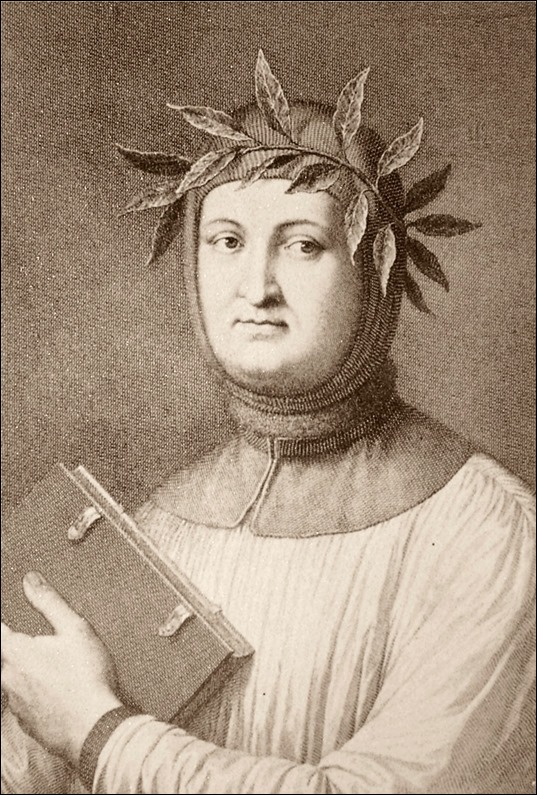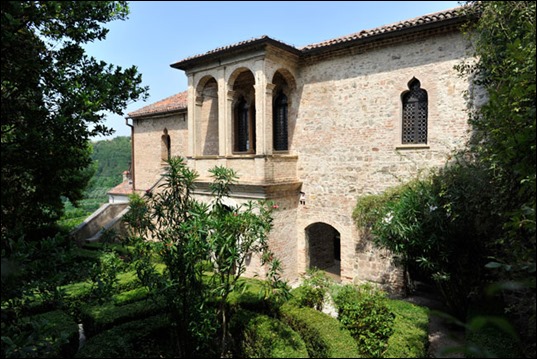Today is San Valentino, la Festa degli Innamorati (Saint Valentine’s day), and to celebrate it what better way than reading a beautiful love poem by Francesco Petrarca. Born in Arezzo (Tuscany) on the 20th of July 1304, from Florentine parents, Petrarca is considered one of the fathers of the Italian language, alongside Dante and Boccaccio. His love poems are dedicated to Laura, a beautiful woman who he saw for the first time on the 6th of April 1327 in the church of Santa Chiara in Avignon.
 |
| Francesco Petrarca |
This particular poem, Sonetto 90, Sonnet Number 90, was written several years later, and describes Laura’s beauty, which, despite fading away with the passing of time, is still as fresh and powerful in the memory of the poet as it was when he first saw her.
Erano i capei d’oro a l’aura sparsi,
che ‘n mille dolci nodi gli avolgea,
e ‘l vago lume oltra misura ardea
di quei begli occhi, ch’or ne son sì scarsi;
e ‘l viso di pietosi color farsi,
non so se vero o falso, mi parea:
i’ che l’esca amorosa al petto avea,
qual meraviglia se di subito arsi?
Non era l’andar suo cosa mortale,
ma d’angelica forma; e le parole
sonavan altro, che pur voce humana:
uno spirto celeste, un vivo sole
fu quel ch’i’ vidi: e se non fosse or tale,
piaga per allentar d’arco non sana.
 |
| La Casa di Petrarca near Padova |
Parafrasi (Paraphrase into modern Italian):
I biondi capelli erano sparsi al vento,
che li intrecciava in mille dolci nodi,
e ardeva in modo straordinario la luce splendente dei suoi occhi,
che ormai invece ne sono offuscati;
e mi sembrava, non so se fosse vero o meno,
che il suo viso si tingesse di un’espressione di compassione:
io, che avevo l’animo predisposto all’amore,
non c’è da stupirsi se arsi subito di questo sentimento.
Il suo incedere non era quello di una creatura umana,
ma di uno spirito angelico, e le sue parole
avevano un suono diverso da quello di una voce puramente umana.
Io vidi uno spirito celeste, un vivo sole,
e anche se non fosse più tale,
una ferita non si rimargina, per il fatto che l’arco si è allentato.
Our translation:
Her blond hair was blown by the wind,
that tied it in a thousand sweet knots,
and the radiant light in her eyes,
which now are dulled, burned in an extraordinary way;
and it seemed to me, I know not if true or false,
that her face took on the hue of compassion:
it’s no surprise that I, whose soul was predisposed to love,
burned at once with this feeling.
Her movement was not that of an earthly being
but of an angelic spirit, and her words
sounded unlike those of a purely human voice.
I saw a heavenly spirit, a bright sun,
and even if it should be no more,
a wound does not heal because the bow has slackened.







Comments:
William Auge:
Ciao Serena, una meravigliosa poesia d’amore eterno. Questa conservero’.
A presto, Bill
Serena:
@William Auge Ciao Bill! Hai declamato questa poesia a Victoria? 😉
William Auge:
Si, avrebbe potuto essere scritto da me per lei.
ibrahim kenya:
mi piace molto i poet